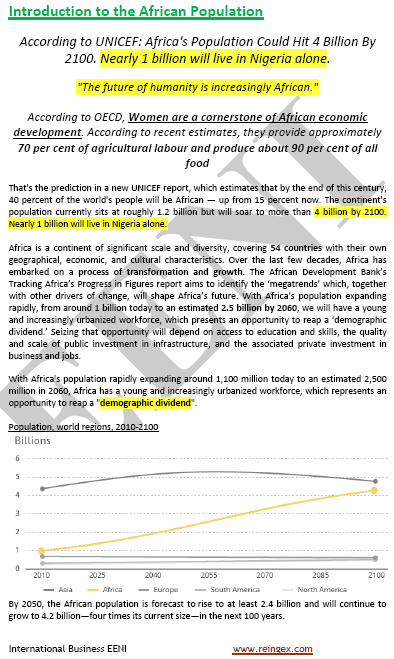African common origin of humanity
All we come from Africa. Colonization of the World by Homo Sapiens. Mitochondrial Eve

The third African revolution (and fundamental): Homo Sapiens. Today it is accepted that humanity, each and every one of us, has a common African origin.
Second part of the article “Africa: The Cradle of humanity”
- Third African revolution (and fundamental): Homo Sapiens
- Origin of humanity (Black Eve/Mitochondrial Eve)
- World's Colonization by Homo Sapiens (Out of Africa)
- Conclusions
We know that due to our homogeneity; we come from a small group of individuals from Africa, placing our origins between 300,000 and 100,000 years.
From this African origin, Homo Sapiens colonized the entire world.
In Asia; he replaced Homo erectus and Neanderthal in Europe. The first Globalization of the history of humanity was realized. Since then, Homo sapiens has not stopped moving.
This hypothesis of a common African origin has been called “Out of Africa.” It should be noted that there is also a multiregional origin hypothesis. However, it seems with no doubt the reality of our African origin.
In 1987 was published a work on the variation of mitochondrial DNA in humans (Cann, Stoneking, and Willson). According to this research, there are two groups regarding the similarity of mitochondrial DNA, one exclusively of the African origin and another of mixed origin. Thus, they estimated that:
The origin of humanity would be around 200,000 years ago and, all would come from the same woman, the “Black Eve (Mitochondrial Eve).”
In 1986, Wainscoat submitted its nuclear DNA studies. Their conclusions were that:
The entire humanity comes from six hundred Homo sapiens who lived in Africa 100,000 years ago.
Subsequent studies of chromosomes also have discovered that there was a second migration from Africa 50,000 years ago and ended up colonizing Asia and Australia. It is estimated that Sapiens reached the American continent about 17,000 years ago by crossing the Bering Strait.
It also has been found that in this global migration, the woman was who most moved, being the man most sedentary, indicating a possible patrilocal society (*).
(*) In anthropology, in a patrilocal society man at marriage remains in the parental home along with his wife.
Summary of the last 6 M.Y.
- In Africa, about 5 M.Y., the evolutionary line between hominids and chimpanzees is divided
- About 4 M.Y.: in Kenya, the hominid Australopithecus anamensis begins bipedalism
- About 3 M.Y.: Lucy lived in Africa (Australopithecus afarensis)
- About 2.5 M.Y.: Existence of several African hominids. The first stone tools
- About 2 M.Y.: Back in Africa, appears the first HOMO with a growing brain
- 1.5 M.Y.: The first axes. Colonization of Asia and Europe. Homo neanderthalensis in Europe and Homo erectus in Asia
- 100,000 years ago: in Africa again appear early Homo sapiens, who coexisted for a time with Homo Erectus and Neanderthal
- 50,000 years ago: The first cave paintings and burials. Sapiens begins the colonization of the World from Africa
- 25,000 years ago all Homo species except Homo sapiens have disappeared. Homo Sapiens is present worldwide
Conclusions.
As we have seen:
Africa has the leading role in the last 6 million of years.
All these changes have taken place in a continent today marginalized. All of us, each one of the 7,000 million of humans who are living in the five continents; we have a common origin since that 100,000 years ago a small group of the African Homo sapiens began colonizing the world.
In the African lands will emerge one of the major civilizations of all times, the Egyptian Civilization, and today we know, thanks to the studies of Cheick Anta Diop, the solid relationship between Africa and the Egyptian civilization. Cheick Anta Diop also discussed, among other issues, the contributions of Africa to humanity.
Maybe, the first monotheistic conception of the story emerged in Egypt with the figure of Akhenaton (1,300 BCE).
“Africa has a history. Africa is the cradle of humanity and where the history was born. That is why every African, every African should be, here and now, an added value. Each generation has to build pyramids.” Joseph Ki-Zerbo.
Something that Western historiography has ignored for centuries.
In recent centuries, African Civilization interacts with the Islamic and Western Civilization. Two external religions, first Christianity penetrating North Africa and later Islam, take root in Africa. Perhaps this is one of the greatest threats facing Africa today: a possible clash of civilizations, especially in the Sahel.
Africa suffered the greatest scourge of humanity, the slave trade for 400 years; UNESCO estimates that between “25 and 30 million of the Africans were deported, not counting the number of dead in the ships, wars, and raids.” Slave Trade will be one of the foundations of the political and economic domain of Western Civilization.
Africa has experienced the African Diaspora, the colonialism, the independence, the destruction of many traditional values, the effects of the cold war, bloody civil wars, new pandemics such as AIDS, the draconian conditions of debt, or the marginalization in the Globalization process (today Africa only accounts for 3% of world trade).
However, Africa's future is optimistic.
The UNICEF recently stated that “the future of humanity is increasingly African.” Today, Africa's population is 1,100 million people (of a total of 7,000 million), 1.6 billion in 2030 and 4,000 million of the Africans in 2100, which will mean that in thirty-five years, 25% of humanity will be African (and 1,000 million of the Nigerians).
Sample:
In Africa; it is emerging a new middle-class (350 million of the Africans, 34% of the workforce). We have seen the so-called “African mobile revolution”; it is estimated that there are 650 million of mobile phone's users. In 2,040, the African middle-class can be 1,100 million people (42% of the active population). It is also estimated that in 2,040, half of the Africans will live in a city.
In 2050, the African population will reach 2.4 billion and will continue growing till 4.2 billion-four times its current size-in the next 100 years.
Beyond the “demographic dividend of Africa” (it is considered that Africa is the largest labour market in the World thanks to the young population - 60%), the huge natural resources, the emergence of several African economies (half of the World's frontier markets are Africans, Nigeria is the world's largest frontier market and the first African Economy, having displaced to South Africa), and the unstoppable trend towards African Integration (the African Continental Free Trade Area formed by fifty-four countries, 1,000 million people and a combined GDP of 1.2 trillion USD) led by the African Union; it seems that:
Africa takes its rightful role in the history of humanity, taking a new geostrategic, economic, and human status in the Global Economy.

Masters and Doctorate related to African Civilization:

Doctorate in African Business.
 Origine Africain Humanité
Origine Africain Humanité  Origen Africano de la Humanidad
Origen Africano de la Humanidad
 Origem Africano da Humanidade.
Origem Africano da Humanidade.
African Countries: Algeria, Angola, Benin, Botswana, Burkina Faso, Burundi, Cameroon, Cape Verde, Central African Republic, Chad, Comoros, Congo, Ivory Coast, Democratic Republic of the Congo, Djibouti, Egypt, Eritrea, Ethiopia, Equatorial Guinea, Gabon, Gambia, Ghana, Guinea, Guinea-Bissau, Kenya, Lesotho, Liberia, Libya, Madagascar, Malawi, Mali, Mauritania, Mauritius, Morocco, Mozambique, Namibia, Niger, Nigeria, Rwanda, São Tomé and Príncipe, Senegal, Seychelles, Sierra Leone, South Africa, Sudan, South Sudan, Eswatini, Tanzania, Togo, Tunisia, Uganda, Zambia, and Zimbabwe.
Author: Pedro Nonell.
(c) EENI Global Business School (1995-2025)
Top of this page










 WhatsApp
WhatsApp